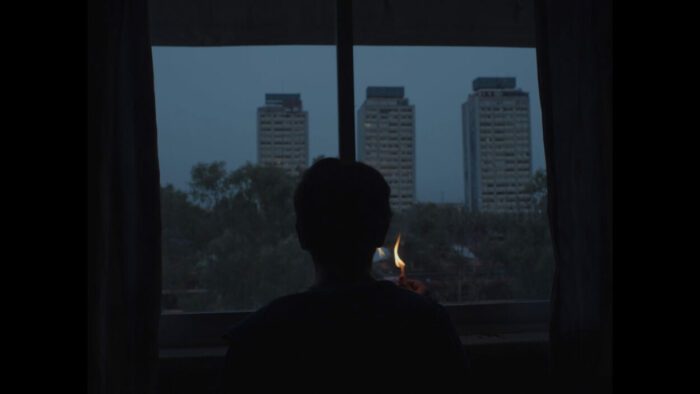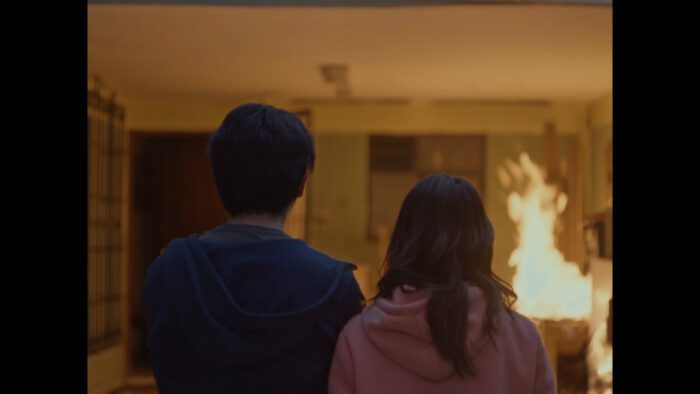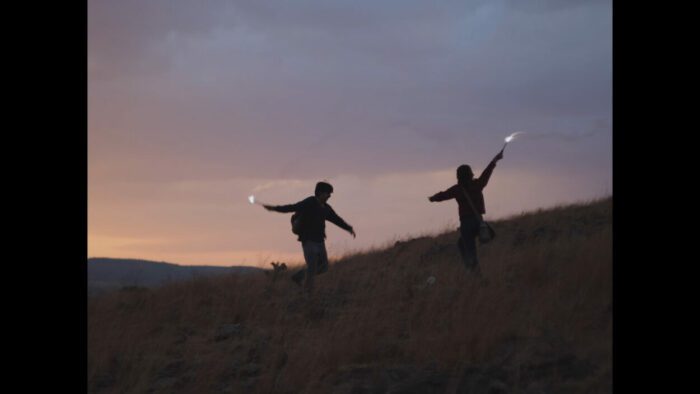Like so many a teenager, young Bruno, the protagonist in Mexican writer-director Mauricio Calderón Rico’s debut feature All the Fires (Todo los incendios), is troubled. In his particular case, it’s the loss of a parent he’s grieving. His father has passed away and his mother is moving on. Upset by change and unable to articulate his grief, Bruno turns to fire: when feeling aggrieved or agitated, he lights a match, setting small, at first controllable fires, documenting his actions on social media for his growing audience of followers. There, he finds the attention and validation he lacks elsewhere.
All the Fires is set in the not-too-distant past, in earlier versions of Windows and YouTube that will look uncannily familiar. That Bruno (Sebástian Rojano) finds an audience for his budding pyromania should hardly surprise, given the ways in which influencers and media celebrities have come to monetize society’s apparently insatiable need for short-form video of humans—and cats—engaged in activities ranging from meaningless to purposeful. As Bruno’s grief manifests itself in fire-setting and video-sharing, his small online audience grows as well.

Unable to connect at all with his mother (Ximena Ayala)—she’s moved on to a new beau whose mere presence proves an affront—Bruno explores a friendship with Ian (Ari López), a local boy, which proves equally vexing. Ian is clearly interested in more than a merely platonic relationship and surprises Bruno with a kiss. But nothing in Bruno’s development has up until this moment even so much at hinted at queerness, and he recoils in disgust. Nothing, it seems, provides him any comfort or solace, save for setting fires and sharing his videos online.
When one of his followers expresses a particular interest in him, even going so far as sexting some enticing underwear pics, Bruno thinks he may have found his outlet. “Daniela”—at first neither he nor we are sure she is who she says she is or represents as: Bruno seems a likely mark for a catfisher—wants to meet him. So when he decides to run away from home, he seeks her out, taking the bus from Mexico City to Durango where he meets her, her progressive and permissive parents, and her local queercore community. It’s a shock to his sheltered system, but as he and Daniela (Natalia Quiróz) set fires and share moments together, Bruno is launched into an overdue journey of self-exploration and forced to confront his feelings for her and for Ian both.

All the Fires is a peculiar coming of age story, a slow burn if you will of small moments. Bruno’s pyromania starts as a benign means of self-gratification, but escalates incrementally into something more dangerous. It’s not his intent to harm others, but his method of impulse control is one that can become a full-fledged disorder. I like that Calderón Rico never fetishizes or glamorizes the fires Bruno sets: the naturalistic, documentary-style cinematography charts Bruno’s fascination with flame but does not share or exploit it. His developing pyromania is depicted as a significant character trait, not a mere plot contrivance, and certainly not as an excuse for cinematic excess.
Shot in a narrow aspect ratio with hand-held cameras, All the Fires never sensationalizes what might easily be sensationalized. There are, though, moments of quiet beauty, especially as Bruno and Daniela first meet. Sparks turn to flames when their shared love of fire symbolizes a teenage passion, even if Daniela’s life is more complex than Bruno might have assumed.

What this quiet film does best of all is to chart a young and relatively cloistered boy’s introduction to a social circle, a culture, that is queer. When first confronted with a kiss by Ian, Bruno recoiled in shock. But when he meets Daniela and his friends, Bruno begins to realize that relationships, that humans, can be more complex and more dynamic than he was raised to understand. All the Fires avoids the clichéd tropes of coming-out pronouncement scenes or cinematic epiphanies and lets a series of small, expertly shot and acted scenes chart Bruno’s slow introduction to a community and a lifestyle he did not know existed and that will change his life.
As Bruno, the grieving teenage pyromaniac, Rojano is in nearly every scene. His character is quiet, expressing himself primarily through fire-setting and video-sharing, but the performance is excellent. The supporting cast is as well, particularly Quiróz as the enigmatic Daniela whose life swirls with energy. Scenes with her open, ebullient, almost impossibly warm parents (Iliana Donatlán, Antonio Fortier) provide a brief bit of comic relief to an otherwise mostly sober storyline. Overall, the film’s tone reminds me more than a little of the recent Argentinian LGBTQ+drama Sublime, which also focused on a teen boy’s coming-of-age-and-out, in that instance with a guitar instead of a match.
Writer-director Calderón Rico has crafted this story in part from his own experience grieving the loss of his father and searching for sexual acceptance, initially for his master’s thesis. It’s difficult not to watch All the Fires constantly worrying for young Bruno: will he suffer from the toxic homophobia that leads too often to violence? Will his pyromania consume him? Will he himself turn to violence? But this film is not one that exploits its characters and setting for melodrama. Instead, All the Fires offers a quieter, slower-burning character study of a young boy’s grief as it manifests itself through a developing coping disorder and an earnest exploration of sexual identity.
All the Fires (Todos los incendios) debuted in North America at NewFest, New York’s LGBTQ+ Film Festival, in October 2023. 96 min, in Spanish and English with English subtitles.




